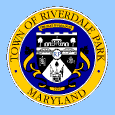
The Early Years
|
Global Navigation Links
Local Navigation Links
|
In a few weeks the final year of the 1900s will pass into history. As the last century closed, families had begun to settle here and, in the early decades of this century, they came together and founded our town. For the interest of long-time and new residents, I offer a brief review of highlights of those times.
One hundred years ago, in 1899, the Town of Riverdale Park had not yet been incorporated. There were about 50 families living here in new homes clustered around the B&O railroad line. A school was opened in 1895 with a first enrollment of 40 students. And in 1897, the Riverdale Presbyterian Church, located on the high rise which now is the site of the Calvert Memorial Park, had been dedicated. Also, in 1899, the City and Suburban Railway began to run streetcars from downtown Washington to the suburbs-- providing a second convenient transit opportunity to Riverdale residents.
Ten years later, the 1910 census figures showed that there were about 140 residences and a population of almost 1000 persons. Soon after, neighbors visiting on front porches or chatting across back yard fences began to discuss the subject of becoming an incorporated town. These first families lacked control over their daily needs--mail was not delivered to their doors, fire and police services were minimal and they wanted streetlights and paved roads.
As a result, a group of residents requested the Prince George's County Delegation to recommend incorporation in the 1912 session of the Maryland General Assembly. After consideration, the delegation issued a report rejecting the request. The historical record is unclear on the reason.
Over the next eight years, the turbulence of World War I and the activities of the Women's Suffrage Movement were major events which had an impact on the men and women who lived here; the subject of incorporation appears to have taken a lower priority.
Research does not reveal a complete record of the Riverdale families affected by World War I, but a partial list of those who served in the Great War names 18 men and two women. There is also written record that the women who stayed at home gave their support by wrapping surgical bandages for military hospitals and offering volunteer help.
Newspaper accounts describe a suffrage march on Washington in 1913 that paraded along Baltimore Avenue. The Evening Star reported that a local suffrage organization fed the marchers and found them lodging in private homes. Although it is unknown whether any Riverdale women were involved in these events, by 1918 a Riverdale Suffrage Party was founded.
During the eight year span between 1912 when the first attempt at incorporation failed and 1920, local events reenforced the stability of the community. A six-room school house was constructed in 1916 at the site of today's elementary school. This larger building was needed because of the expanding student enrollment. Also, new businesses arrived to serve the needs of the families who settled here. Among them was a garage on Baltimore Avenue which offered services for the increasing number of automobiles that were rapidly replacing public transit use.
It was on April 17, 1920, than Governor Albert Ritchie signed a bill approving incorporation of the Town of Riverdale, pending resident approval. On June 14, 1920 residents approved the incorporation. Of interest, residents eligible to vote on that day in June and in the July 1920 election of the first Mayor and Council were defined as men age 21 or older. Only a few weeks later in August, Tennessee became the 36th state--the last one required to ratify the federal suffrage amendment, giving women the right to vote.
(This review was prepared from material in The Riverdale Story, From Mansion to Municipality, written by the 75th Anniversary Book Committee. The book may be purchased at the Town Hall).
This page was last changed on Tuesday, November 2, 1999. Questions, comments, or submissions? See the Website Committee web page. This page has been accessed times.